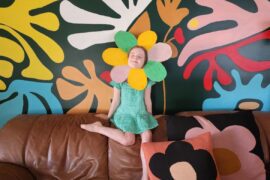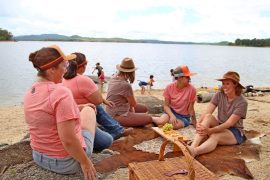It is critical for caretakers to respond in ways that conveys they can take care of them, handle their behaviour and emotions, as well as ensure separation is not used as a consequence or punishment.
The more sensitive the child, the greater the need for strong, caring, adult attachments.
A strong attachment to a caring adult provides rest and reprieve in a world that feels too much for the sensitive child. The challenge is they often feel they are too much to handle, too big in their responses, and easily overwhelm their caretakers. It is critical for caretakers to respond in ways that conveys they can take care of them, handle their behaviour and emotions, as well as ensure separation is not used as a consequence or punishment.
Sensitive children need strong alpha, caring adults to tether themselves to for security and leadership. The adult may have to work harder to gain their trust as they are typically perceptive and can read false presentations well. There must a generous invitation for relationship characterized by warmth, enjoyment, and delight. Adults need to invite the child to depend on them and not be displaced from their caretaking role. Caretakers will need to take up a strong position in orienting the child to their environment, explaining what they have trouble understanding, and introducing them to people who will assume responsibility for them such as teachers, coaches, dentists, or doctors.
How can we give sensitive kids the best environment to grow up in?
While it is true all children need safe and secure environments to grow in, it is critical in deciding whether an orchid child will thrive or wither. The following strategies will help create healthy contexts and relationships benefiting all children but in particular sensitive kids.
- Protect them from experiences that are too much.
When environments, relationships, and experiences are too much for a sensitive child, their caretakers need to read the situation and protect them accordingly. For example, a parent may sign a young child up for a music class only to experience them running for the door each time the noise starts. The child may find visual or auditory stimuli overwhelming and as a result, need to spend shorter times in these environments, if at all. It is important for the adult read what a child is capable of, even in small doses, and not shelter them altogether. Pushing them beyond their limits typically leads to the sensitive child either shutting down or exploding with upset. - Lead the child into vulnerable territory.
Sensitive children are known for their avoidance of emotional content that is too upsetting or alarming. They may shy away from sad stories in books and get scared watching children’s TV shows. Parents need to walk them gently in these directions when you need to, not pushing but inviting them to express what is going on for them. They may try to deflect attention from these feelings so reading the cues as to what is most difficult helps the adult understand what stirs them up most of all. When upsets happen in their life, they may need a cooling off period to reduce the intensity of the experience. After such time they will be better able to talk about what stirred them up but it will likely require an adult leading them there. Acknowledging their big feelings, naming them, and normalizing them helps them to form a better relationship with an internal world that often feels too big. - Bridge all separation and problem behaviour
When proceeding with discussions about behaviour, it is best to deal with it outside the incident, in the context of a warm relationship, and to touch the issue gently. When you convey what didn’t work, make sure to communicate the relationship is still okay. Make it easy for them to hear your words of guidance and keep your relationship strong. Incidents are best deferred to when intense feelings have subsided. In the heat of the moment you can simply inform them “the behaviour isn’t okay and you will talk to them later about it.” They may tell you, “I don’t want to talk about it,” to which you will let them know you will make it easy, quick, and as pain free as possible but sometimes things need to be said and dealt with. - Help them find their tears when needed
At the heart of resiliency in all children is the capacity to have their tears about all the things they cannot change or do not go their way. Sensitive children often have big expectations and plans that are not always realized. They may want good experiences to continue indefinitely, to be perfect and avoid failure, or to change someone’s mind when they don’t agree. The things they cannot change will frustrate them greatly with big eruptions ensuing, especially in the early years. When the intensity of these emotions is drained through their eruptions, holding them in their frustration until they can cry is helpful. In these soft, vulnerable tears are the seeds of resiliency in realizing they can survive when life doesn’t go their way. In order to help them shed these tears they will need strong, caring adults who are not afraid of their child’s big feelings. If a sensitive child’s tears disappear, a host of behaviour and learning challenges can be left in their wake. Restoring emotional vulnerability is the best avenue for bringing the child to rest again and resolving these issues.
While every child is born with differences in their inherent makeup, the reassuring answer is adults in their life are key in creating the conditions for growth. The needs of the sensitive child sheds light on the importance of adult attachments that is true for all children. If we can make sense of sensitive kids, we can help them flourish and express the wonderful potentials that exist inside of them. As caretakers of our children we have the power within us to significantly alter the trajectory of their development.
References
[i] Boyce, T. (2014). Orchid children and the science of kindness. Dalai Lama Centre for Peace and Education, Vancouver, BC. https://www.youtube.com/watch?v=_mSrc0GFpJw [ii] Ellis, B.J., Boyce, W. T. (2005). Biologial sensitivity to context: Empirical explorations of an evolutionaly-developmental theory. Development and Psychopathology. V. 17,(2), pp. 303-328. [iii] Same as above [iv] Neufeld, G. (2013). Level I Intensive: Making Sense of Kids. Neufeld Institute Vancouver, BC, Canada. www.neufeldinstitute.com.Originally published HERE.
Deborah MacNamara is a clinical counsellor and educator, on faculty at the Neufeld Institute and author of Rest, Play, Grow – Making Sense of Preschoolers (or anyone who acts like one). She has more than 25 years experience working with children, youth, and adults and speaks regularly about child and adolescent development to parents, childcare providers, educators, and mental health professionals. Please see www.macnamara.ca for more information.










